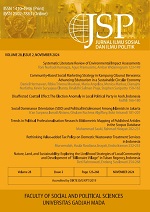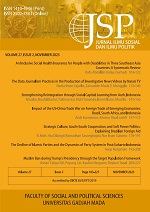Explaining Zimbabwe’s Survival Against Sanctions (1997-2017): A Resilience Perspective
Justin Itayi Mujaji(1*)
(1) Universiti Utara Malaysia, Malaysia
(*) Corresponding Author
Abstract
International economic sanctions (IES) were imposed on Zimbabwe by Western sanctions-imposing nations (SINs) from 1997, when President Mugabe was still in power. This study examines how Zimbabwe survived the IES menace during President Mugabe’s reign (1997-2017) and highlights how conventional theories on resistance against sanctions did not adequately acknowledge the concept of resilience in Zimbabwe. This problem arose because current resistance theories tended to apply only to the SINs and not the IES target countries (including Zimbabwe), which were often labelled as anti-democratic and pro-terrorism. The findings of this study were that President Mugabe, his government, and the people of Zimbabwe had extraordinary resilience against IES, hence the continued existence of the country as a unitary state by 2017. The study adopted an interpretivist philosophy to understand the real-life situations of respondents, as reflected by their behaviours and preferences. Primary data was collected through in-depth interviews and focus group discussions, while the secondary data was gathered from desk research. In addition, triangulation techniques were employed to enhance the validity and reliability of findings. The study draws on resilience theory, with the researcher coming up with a resilience model (ZRM) to help explain Zimbabwe’s survival. Resilience theory is a unique approach because, whilst the concept had previously been the preserve of scientific areas like engineering, public health, social sciences, psychology, and others, its importance has been overlooked in the area of IES. By re-contextualising the resilience phenomenon to IES, the study makes an important contribution to knowledge.
Keywords
Full Text:
PDFReferences
Bělín, M., & Hanousek, J. (2021). Which sanctions matter? analysis of the EU/Russian sanctions of 2014. Journal of Comparative Economics, 49(1), 244–257. https://doi.org/10.1016/j.jce.2020.07.001
Bishop, C. (2020). Former PM (Blair) is far from bitter and ready to meet Mnangagwa.
Braun, V., & Clarke, V. (2022). How to Do Thematic Analysis|Step - by - Step Guide & Examples. 1–9.
Chipanga, C., & Mude, T. (2015). An Analysis of the Effectiveness of Sanctions as a Law Enforcement Tool in International Law: A Case Study of Zimbabwe from 2001 to 2013. Open Journal of Political Science, 05(05), 291–310. https://doi.org/10.4236/ojps.2015.55031
Forrer, J. (2017). Economic Sanctions: Sharpening a Vital Foreign Policy Tool. Atlantic Council: Global Business & Economic Programme, 1–12.
Grebe, J. (2010). And they are still targeting: Assessing the effectiveness of targeted s anc tio ns agains t Zim babwe. Af ri c a Spectrum , 45 (1), 3–29. https://doi. org/10.1177/000203971004500101
Hartigh, J. R., & Yannick, H. (2022). Conceptualization and Measuring psychological resilience. Elsevier Psychology Journal, 66(1), 1–866.
Junjie, M. A., & Yingxin, M. A. (2022). Discussion on Positivism & Interpretivism. Global Journal of Humanities, 14(1), 10–14.
Kankam, P. K. (2020). A pproac hes in Information Research. In New Review of Academic Librarianship, 26(1), 165–183. https://doi.org/10.1080/13614533.2019.1632216
Landale, J. (2017, November 15). How UK-Zimbabwe relations went sour. The Guardian.
Louw-Voudran, L. (2018). Who has the power in SADC? ISS Today.
Mararike, M. (2019). Post-Colonial Hangover-A Critique of ZIDERA 2001-2018. International Journal of Social Science Studies, 7(1), 28–39.
Mararike Munoda. (2019). Post-Colonial Hangover-A Critique of ZIDERA 2001-2018. International Journal of Social Science Studies, 7(1), 28–39.
Mavhunga, C. (2018a). A brief history of Chimurenga as a Communal Laboratory. A Faith & Ideology Paper. (1; 1).
Mavhunga, C. (2018b). A brief history of Chimurenga as a Communal Laboratory. A Faith & Ideology Paper. (1; 1).
Mkodzongi, G., & Lawrence, P. (2019). The fast- track land reform and agrarian change in Zimbabwe. Review of African Political Economy, 46(159), 1–13. https://doi.org/10.1080/03056244.2019.1622210
Morgan, T. C., Syropoulos, C., & Yotov, Y. V. (2023). Economic Sanctions: Evolution, Consequences, and Challenges. Journal of Economic Perspectives, 37(1), 3–30. https://doi.org/10.1257/jep.37.1.3
Murwira, Z. (2020, October 26). Anti-sanctions: AU & SADC reaffirm support for the lifting of sanctions on Zimbabwe. The Herald.
Ngwenya, C., & Molapo, R. R. (2018). Politics and history of the armed struggle (Zimbabwe). Journal of Contemporary History, 43(1), 70–90.
Noble, H., & Heale, R. (2019). Triangulation in research, with examples. Evidence- Based Nursing, 22(3), 67–68. https://doi.org/10.1136/ebnurs-2019-103145
Ogbonna, C. C. (2017). Targeted or Restrictive: Impact of U.S. and EU Sanctions on Education and Healthcare of Zimbabweans. African Research Review, 11(3), 31. https://doi.org/10.4314/afrrev.v11i3.4
Palinkas, L. A., Horwitz, S. M., Green, C. A., Wisdom, J. P., & Hoagwood, K. (2016). Purposive Sampling in Qualitative Data Collection & Analysis in Mixed Methods Implementation Research. Journal of National Institutes of Health, 42(5), 533–544.
UNFPA/ZimStat. (2017). Inter-Censual Demographic Report 2017.
Van Breda, A. D. (2018). A critical review of resilience theory and its relevance for social work. Social Work (South Africa), 54 (1), 1–18. https://doi.org/10.15270/54-1-611
Article Metrics
Refbacks
- There are currently no refbacks.
Copyright (c) 2025 Jurnal Ilmu Sosial dan Ilmu Politik

This work is licensed under a Creative Commons Attribution-ShareAlike 4.0 International License.























